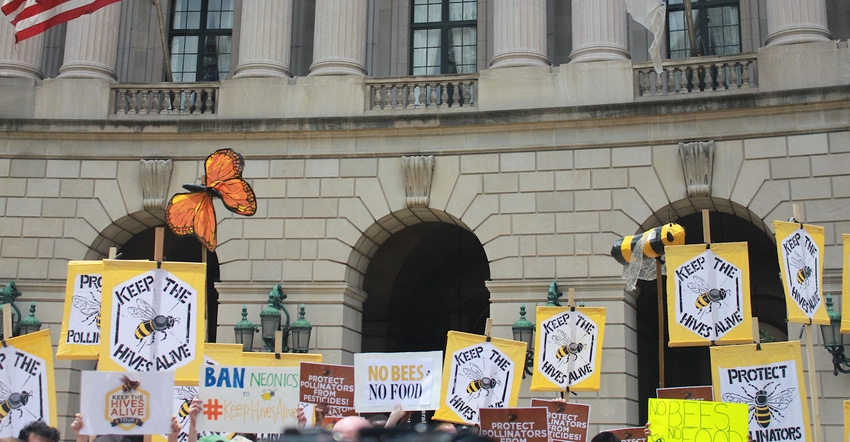Thousands of comments urge EPA to rein in pesticides in effort to protect pollinators.

Rep. Earl Blumenauer (D., Ore.), alongside Rep. Jim McGovern (D., Mass.) and conservation, farmworker, farmer and consumer groups, reintroduced the Saving America’s Pollinators Act, which aims to suspend the registration of certain neonicotinoid insecticides until the Environmental Protection Agency conducts a full scientific review.
In addition, 16 environmental and conservation groups have collected more than 100,000 public comments urging the agency to rein in what they view as “rampant overuse” of neonicotinoid pesticides, which they allege is a leading cause of pollinator population declines.
Last week, at the industry's request, EPA extended its comment period on preliminary ecological and human health risk assessments for the neonicotinoids clothianidin, thiamethoxam and dinotefuran and a preliminary ecological risk assessment for the neonicotinoid imidacloprid. The EPA risk assessments found deadly impacts to birds from neonicotinoid-treated seeds, poisoned insect prey and contaminated grasses.
University researchers have found that tiny amounts of neonicotinoids are enough to cause migrating songbirds to lose their sense of direction and become emaciated. A recent study by U.S. Geological Society researchers found widespread neonicotinoids in the Great Lakes at levels that may potentially harm aquatic insects — the foundation of healthy aquatic ecosystems.
Europe has instituted a temporary ban on neonicotinoids based on their harm to pollinators. Canada’s pesticide regulatory agency has recommended banning the most widely used neonicotinoid based on harm to aquatic ecosystems.
The pesticide industry defended its own and EPA’s actions to protect pollinator health.
“Pollinator health is integral to the ability of the agriculture community to provide safe and affordable food to all Americans,” CropLife America (CLA) president and chief executive officer Jay Vroom said. “We work with EPA and other agencies to help ensure that pollinator health is appropriately evaluated when regulating our products, and we work with all stakeholders through various coalitions to address pollinator health issues.
“Further, CLA believes that EPA has all the statutory authority it needs to adequately protect pollinators and that new legislation is not currently needed,” Vroom added.
The environmental community thinks otherwise.
Betsy Southerland, former director of EPA’s Office of Science & Technology, said, "Scientists at EPA are treated as irrelevant now because they are no longer part of the decision-making process. All environmental decisions come out of (EPA) Administrator (Scott) Pruitt's private meetings with industry and agribusiness."
The groups questioned whether EPA is able to make its decisions based on the information at hand.
Genna Reed, science and policy analyst for the Union of Concerned Scientists, said, “The EPA has an important mission: protecting people and the environment from harm. The EPA's leadership can't do their job unless they listen to their own scientists and make decisions that reflect the facts. At a time when EPA staff is shrinking and science advisors at the agency are underutilized, it is critical that the agency act to enforce safeguards that really protect people, informed by the evidence.”
“By harming pollinators like bees and butterflies and natural pest control agents like birds and beneficial insects, neonicotinoids are sabotaging the very organisms on which farmers depend,” said Cynthia Palmer, director of pesticide science and regulation at the American Bird Conservancy. These chemicals have become ubiquitous in the food supply. Testing carried out by the American Bird Conservancy and the Harvard T.H. Chan School of Public Health found neonicotinoids in nine out of 10 bites of food from House and Senate dining halls, with some foods containing as many as five types of neonicotinoids.
“Neonics are already implicated in mass bee die-offs, and now, the EPA’s own science makes it clear that these dangerous chemicals have a much broader ecological impact,” said Rebecca Riley, senior attorney with the Natural Resources Defense Council. “It is time for the regulators to regulate and put the brakes on the widespread use of these dangerous chemicals. As EPA balks at its regulatory responsibilities, Congress should do its part by advancing the Saving America’s Pollinators Act to safeguard our wildlife, food supply and public health.”
About the Author(s)
You May Also Like



.png?width=300&auto=webp&quality=80&disable=upscale)

